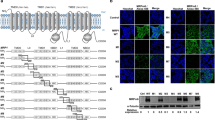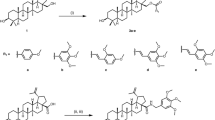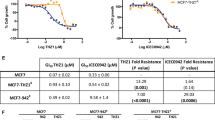Abstract
The thioether phospholipid ilmofosine (BM 41 440) is a new anti-cancer drug presently undergoing phase II clinical trials. Because resistance to anti-tumour drugs is a major problem in cancer treatment, we investigated the resistance of different cell lines to this compound. Here we report that the multidrug-resistant cell lines MCF7/ADR, CCRFNCR1000, CCRF/ADR500, CEM/VLB100 and HeLa cell lines transfected with a wild-type and mutated (gly/val185) multidrug resistance 1 gene (MDR1) are cross-resistant to ilmofosine compared with the sensitive parental cell lines. In CEMNM-1 cells, in which the resistance is associated with an altered topoisomerase II gene, no cross-resistance to ilmofosine was observed. Ilmofosine is not capable of modulating multidrug resistance and neither does it reduce the labelling of the P-glycoprotein (P-gp) by azidopine nor alter ATPase activity significantly. The resistance to ilmofosine in multidrug-resistant CCRF/VCR1000 cells cannot be reversed by the potent multidrug resistance modifier dexniguldipine-HCI (B8509-035). A tenfold excess of ilmofosine does not prevent the MDR-modulating effect of dexniguldipine-HCl. Treatment of cells with ilmofosine does not alter the levels of MDR1 mRNA. Long-term treatment of an ilmofosine-resistant Meth A subline with the drug does not induce multidrug resistance, indicating that ilmofosine does not increase the level of P-gp. Determination of the MDR2 mRNA levels in the cells revealed that the resistance pattern to ilmofosine is not correlated with the expression of this gene. It is concluded, therefore, that multidrug-resistant cells are cross-resistant to ilmofosine and that the compound is not a substrate of Pgp. No association between the expression of the MDR2-encoded P-gp and resistance to ilmofosine was observed. It is supposed that MDR1-associated alterations in membrane lipids cause resistance to ilmofosine.
This is a preview of subscription content, access via your institution
Access options
Subscribe to this journal
Receive 24 print issues and online access
$259.00 per year
only $10.79 per issue
Buy this article
- Purchase on Springer Link
- Instant access to full article PDF
Prices may be subject to local taxes which are calculated during checkout
Similar content being viewed by others
Author information
Authors and Affiliations
Rights and permissions
About this article
Cite this article
Hofmann, J., Utz, I., Spitaler, M. et al. Resistance to the new anti-cancer phospholipid ilmofosine (BM 41 440). Br J Cancer 76, 862–869 (1997). https://doi.org/10.1038/bjc.1997.476
Issue Date:
DOI: https://doi.org/10.1038/bjc.1997.476



